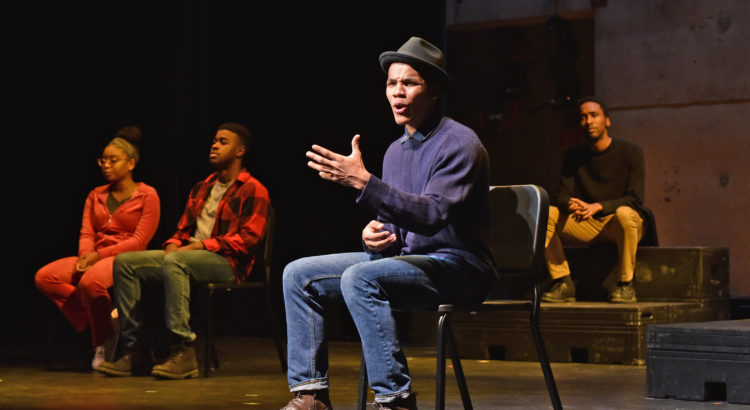The Exonerated was a well-written and evocative play. The six stories were effectively interwoven with smooth transitions, and the music segwayed well between scenes. The unfolding of events was compelling and heartbreaking. To balance out the anger, grief, and hopelessness, the play also utilized elements of religion or the divine to bring hope. I walked away with so many emotions and was unsure of what to do. What can I do to advocate for people who have been wrongfully accused of a crime and imprisoned? I don’t know.
Each storyline had possible “reasons” for why someone was wrongfully accused (because as an audience, consumer of stories, and general human beings we are inclined to look for reason and logic, and the playwrights acknowledged this). In three of the six stories, it was “because of” the person’s race. Most, if not all, of the stories took place in the 1970s (Not to say that racism no longer exists, but blatant racism was more prevalent during that decade.) Even when there was no evidence—or even more despicably, when there was evidence that indicated that they were innocent—they were tried and convicted.
The other two stories were about white men. One man’s parents were brutally murdered, he was convicted, and years later someone found out the murderer(s) were actually members of a gang. The other man was accused of being a “perverted, bloodthirsty homosexual” who took out his anger by murdering a woman. The play did not go into detail about his sexuality; later on, he married a woman, so he may have been straight or bisexual. But his sexuality was not relevant. What was relevant, was the label of being “gay” was put on him to convince people in the court that he was guilty (Remember that the conversion therapy [a recognized form of torture] trend started in the 1970s. It’s still legal in some states, and gay marriage only became legal in 2015). News of his presumptive sexuality was broadcasted on television and he was raped in prison. His perpetrators carved profanity into his skin, so deep that plastic surgery could not repair the damage. Awful, awful stuff.
The remaining story was about a woman who, even after someone else admitted to committing the murder, was left in prison for another sixteen years. She was the first woman to ever be put on death row.
The “reasons” why the latter three people were falsely convicted were less clear. Perhaps because we do not (I did not) generally think of white people being cheated by the justice system (unless they are a female in the context of sexual assault), and the narrative of the illy treated African American is so disgustingly common.
The most important thing I want to point out is that even now, people are wrongfully convicted all the time. This narrative is not unique to the 1970s. Being a victim of systematic injustice does not just happen to African Americans, or women who are sexually abused, or gay white men. It is not unique to a certain race or social class. Plenty of children of all races and social class are under the guardianship of caregivers who abuse them, sometimes for decades, even when Child Protective Services has already been called numerous times.
Of course, being wrongfully convicted is more common for certain demographics because our justice system favors the economically well off (if you don’t have the means to hire a lawyer, you may be assigned one who is overworked, underpaid, unexperienced, or has no intention of looking out for your best interest. It happens all the time.) Or, being of a privileged social status may decrease your chances of becoming a victim. But it does not prevent it. What I have learned throughout the years, is that the court system is all about connections and social status.
Why, when two people commit murder, one is put on death row and the other is sentenced ten years in prison, and then gets out in three? Where is the logic? What do we do in a society that wrongfully convicts the innocent and acquits the guilty? That’s not to say there aren’t any success stories. But I often wonder, do we have a justice system? Or do we have a system that places blame? Personally, I believe it is the latter.
For the unlucky ones—when you come out of prison, you have to learn how to feel again. If you didn’t have problems with mental health before prison, you most likely will have them after being in that kind of an environment.
I feel compelled into action. But I don’t know what to do. The only bandage I can think of for this enormous wound is compassion. Believe someone. Being wronged by the justice system does not automatically mean you lied or did something wrong. Sometimes, the most damaging experience isn’t the traumatic incident itself, but afterwards, when people don’t believe you. Or when your credibility is scrutinized in court. Or when you have to recount every traumatic moment in excruciating detail while prosecutors cross-examine you and question why your description of the events was not precisely the same as the testimony you gave six months or two years ago. Because yes, court cases do get dragged on for that long, and often much longer.
Be aware of our unjust “justice” system. We may not be able to eradicate the unfair and immoral. But we can listen.
*photos by Peter Smith Photography





